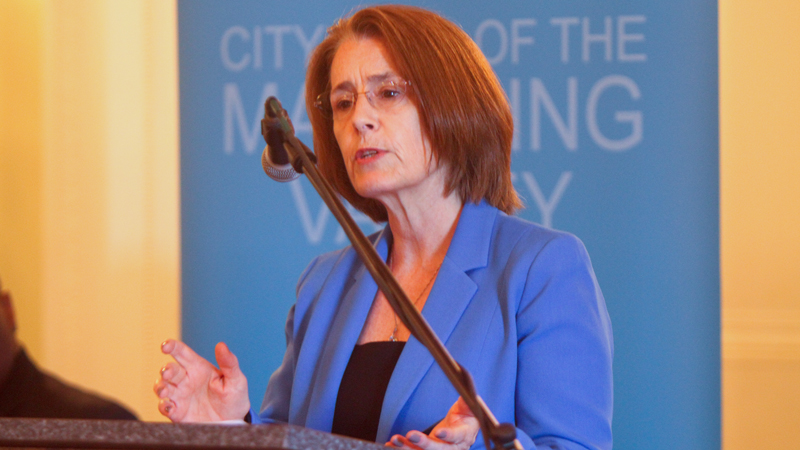Forum addresses building opportunity in the Valley

By SEAN BARRON
news@vindy.com
YOUNGSTOWN
Denis Robinson Sr. recalled a man who, despite rising as early as 5 a.m., was consistently late to his job merely because he had no car.
A lack of transportation was a potential barrier to his success, but the man’s employer addressed the problem by allowing him to start later.
“I believe our investment will be greater than we can ever imagine,” said Robinson, the Youngstown Area Goodwill Industries’ mission-services director, referring to what can happen when businesses are willing to make adjustments and be flexible while providing vital tools to allow for greater worker success.
Robinson shared the story as one of three panelists who took part in a 90-minute forum Thursday evening at Stambaugh Auditorium titled “Closing the Gap: Building Opportunity in the Valley.”
The City Club of the Mahoning Valley hosted the program. Andrea Wood, publisher and editor of The Business Journal of Youngstown, moderated.
The other panelists were T. Sharon Woodberry, Youngstown’s director of community planning and economic development, and Maureen Conway, vice president for policy programs with the Washington, D.C.-based Aspen Institute.
The forum operated on the premise that many people have seen the erosion of bedrock ideals that constitute the American Dream – most notably the idea that hard work results in livable wages and better educational opportunities, in part from a massive conversion from a manufacturing to a service-based economy with largely lower-wage jobs.
It also recognized that this dynamic has been felt across the U.S. , but is acutely prevalent in the Mahoning Valley, which has felt the loss of high-paying manufacturing jobs, wage stagnation, rapid technological advancement and structural racism that has decreased opportunities for many minorities.
One strategy aimed at tackling such barriers has been greater social supports and services to anchor community-based programs that, in part, walk people through the process of finding and maintaining meaningful employment, Robinson said.
Roughly one in four Americans have jobs that pay wages insufficient to lift them above the poverty line. In addition, an estimated 40 percent would be unable to come up with $400 to handle an unforeseen emergency, Conway noted in her presentation.
Conway, who’s also executive director of The Aspen Institute’s economic-opportunities program, noted that changes from a manufacturing to a service economy have had disparate effects on different segments of the local population. And one remedy is to design “opportunity zones” with added resources for areas with disproportionately high poverty levels and low access to economic betterment, she said.
She added that many millennials have less wealth than previous generations doing the same work, despite being generally better educated.
“Work is shaped by laws we make … and the values we hold,” she said.
Conway also discussed the importance of greater connectivity between companies and employees, innovative ways to redesign business models to allow people to contribute more to the company and the value of fostering stronger public/private partnerships to close wage gaps.
She also cited a Chicago manufacturing company that offered worker surveys that acted as a tool to grow the business and allow it to be more stable and profitable.
During the question-and-answer portion, Conway noted that some entities have assisted people who had been incarcerated with developing entrepreneurships and forming their own businesses.
 43
43
